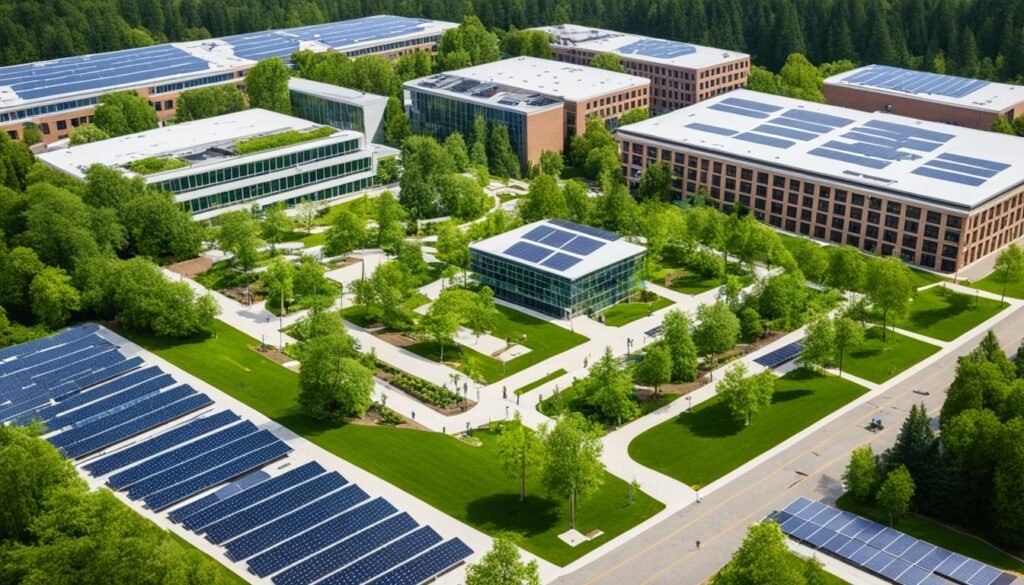The Continents States University is committed to creating a more sustainable future by launching a comprehensive set of green campus programs and initiatives in 2024. With the theme “Going Greener ’24,” the university is taking bold steps to reduce its carbon footprint, promote eco-friendly practices, and engage the entire campus community in the journey towards a more sustainable world.
Recognizing the pressing need to address the global challenge of climate change, the Continents States University has made sustainability a top priority. Through a range of innovative programs and initiatives, the university aims to empower students, faculty, and staff to become active participants in the fight against environmental degradation and resource depletion.
Key Takeaways
- The Continents States University is launching a comprehensive set of green campus programs in 2024.
- The university’s theme, “Going Greener ’24,” reflects its commitment to sustainability and environmental conservation.
- The university is taking bold steps to reduce its carbon footprint and promote eco-friendly practices across the campus.
- The goal is to engage the entire campus community in the journey towards a more sustainable future.
- These initiatives align with the university’s mission to equip future professionals with the skills, tools, and opportunities needed for successful integration into the global workforce.
The Importance of Sustainable Campuses
University sustainability is a crucial aspect of modern higher education, as campuses play a vital role in addressing environmental challenges and promoting ecological conservation. By adopting green initiatives, universities can significantly reduce their carbon footprint, conserve natural resources, and serve as models for the surrounding community.
Why Going Green Matters for Universities
The environmental impact of university sustainability initiatives is far-reaching. Through campus green initiatives, universities can reduce greenhouse gas emissions, divert waste from landfills, and conserve water resources. These efforts not only benefit the planet but also foster a culture of environmental stewardship among students, faculty, and staff.
The Environmental and Social Impact
The social impact of sustainable campuses is equally significant. By prioritizing environmental responsibility, universities can contribute to the overall well-being of their communities and the regions they serve. These initiatives promote a sense of collective responsibility and empowerment, inspiring students to become agents of positive change in their personal and professional lives.

Ultimately, the adoption of university sustainability practices is a crucial step towards a more sustainable future. By leading by example, higher education institutions can inspire and empower generations of students to take action and make a meaningful difference in addressing the pressing environmental challenges facing our world.
Simple Eco-Friendly Habits for Students
As the Continents States University strives to create a more sustainable campus, students are encouraged to adopt simple yet impactful eco-friendly habits. These small changes can make a significant difference in supporting the university’s sustainability goals and protecting the environment.
Reduce, Reuse, and Recycle
One of the core principles of sustainability is the “reduce, reuse, recycle” mantra. Students are urged to reduce their waste by using reusable water bottles, coffee mugs, and food containers, rather than relying on single-use plastics. Diligent recycling of paper, plastic, and other recyclable materials is also crucial in minimizing the university’s environmental impact.
Energy and Water Conservation Tips
Energy and water conservation are essential aspects of campus sustainability. Students can contribute by turning off lights and electronics when not in use, opting for energy-efficient appliances, and being mindful of their water consumption. Simple habits like taking shorter showers, running full loads of laundry, and reporting any leaks or water wastage can go a long way in conserving precious natural resources.

By embracing these eco-friendly habits, students at the Continents States University can play a vital role in creating a more sustainable campus environment. Their collective efforts, no matter how small, can contribute to the university’s larger sustainability initiatives and inspire others to follow suit.
Green Campus Sustainability Programs 2024
The Continents States University is leading the charge in sustainable campus initiatives with its comprehensive “Going Greener ’24” campaign. This multifaceted program aims to reduce the university’s environmental impact and promote eco-friendly practices across the campus community.
The University’s Initiatives and Goals
At the heart of the university’s sustainability efforts are a series of targeted initiatives and ambitious goals. The university has implemented a Green2Go reusable container program to reduce single-use plastics, launched a water reduction competition among residence halls, and organized an end-of-year move-out donation drive to divert waste from landfills.
In addition, the university has set specific sustainability goals, including increasing energy efficiency, exploring renewable energy sources, and expanding its recycling and waste management efforts. These university sustainability programs demonstrate the institution’s commitment to creating a greener, more environmentally conscious campus.

By embracing these green initiatives, the Continents States University is not only reducing its carbon footprint but also setting an example for other institutions to follow. The university’s sustainability goals and programs have the potential to inspire a wave of eco-friendly changes across the higher education landscape.
The Green2Go Reusable Container Program
One of the standout sustainability initiatives at The Continents States University is the innovative Green2Go reusable take-out program. This groundbreaking effort has replaced disposable containers with eco-friendly reusable alternatives, leveraging the Reuzzi app and QR code system to track student participation and impact.
How It Works and Its Impact
In its inaugural year, the Green2Go program has already made a significant environmental impact. By eliminating more than 100,000 disposable containers, equivalent to a length of 14 miles if laid end-to-end, the initiative has substantially reduced on-campus waste and eliminated contamination in recycling streams. This innovative approach to sustainable dining has also saved valuable resources, transportation emissions, and water usage associated with the manufacturing of single-use containers.

The success of the Green2Go program has been a testament to the university’s commitment to zero waste and environmental impact reduction. Through the use of reusable containers, students have embraced the opportunity to make a tangible difference in their daily lives, contributing to a more sustainable campus ecosystem.
Water Reduction Competition
At Continents States University, sustainability is a top priority, and the campus community is taking action to reduce its environmental impact. One exciting initiative is the water reduction competition among the university’s main campus residence halls. This friendly competition challenges students to achieve the greatest reduction in water usage compared to a baseline period.
Simple actions such as turning off the water when brushing teeth, limiting shower time, washing full loads of laundry in cold water, and promptly reporting any leaks can make a significant impact. By engaging in these sustainable practices, students not only contribute to water conservation efforts but also develop eco-friendly habits that benefit the environment and the campus community.
The water reduction competition fosters a sense of sustainability engagement among the residence halls, as students work together to lower their water consumption. This initiative promotes awareness and encourages the development of sustainable behaviors that can extend beyond the campus walls. The university is proud to support this program, which aligns with its broader goal of creating a greener, more environmentally conscious community.
End-of-Year Move-Out Donation Drive
As the academic year draws to a close, the Continents States University is once again gearing up for its annual end-of-year move-out donation drive. This initiative, now in its fourth year, aims to divert usable items from landfills and give back to the local community. Students are encouraged to donate clothes, electronics, furniture, and non-perishable food items that they no longer need.
Giving Back and Reducing Waste
The GiveItUP donation drive provides convenient collection points in residence halls and outdoor locations, making it easy for students to contribute. Last year, the program diverted an impressive 3,680 pounds of items from the landfill. This year, the university hopes to expand the program’s reach and encourage even greater student participation in this sustainable move-out donation effort.
By donating their unwanted items, students can not only reduce waste but also support the local community. The collected donations are distributed to various charities and organizations, ensuring that these usable goods find new homes and don’t end up in the trash. This move-out donation drive is a crucial part of the university’s commitment to sustainability and community engagement.
Earth Day Celebrations and Activities
At Continents States University, Earth Day is not just a single-day event, but a celebration that spans the entire academic year. As a commitment to sustainability and environmental stewardship, the university encourages students, faculty, and staff to participate in a variety of Earth Day activities and events that promote individual actions to reduce waste, monitor energy consumption, limit water usage, and choose alternative forms of transportation.
These sustainability events aim to foster a culture of environmental awareness on campus and inspire the community to make positive changes that have a lasting impact on the planet. From interactive workshops and eco-friendly art exhibits to campus clean-ups and tree-planting initiatives, the university’s campus engagement efforts showcase the importance of collective responsibility in preserving our natural resources.
By actively participating in Earth Day celebrations, students not only learn valuable lessons about sustainable living but also develop a deeper appreciation for the fragility of our ecosystem. The university’s commitment to Earth Day serves as a reminder that environmental stewardship is a year-round endeavor, where every individual contribution can make a significant difference in shaping a more sustainable future.
Sustainable Buildings and Facilities
The Continents States University is committed to incorporating sustainability principles into the planning, construction, and maintenance of its buildings and facilities across campus. By prioritizing eco-friendly design, energy-efficient systems, and sustainable maintenance practices, the university aims to minimize the environmental impact of its built environment.
These efforts include the use of renewable energy sources, such as solar panels and geothermal technology, as well as water conservation measures like low-flow fixtures and rainwater harvesting systems. The university also prioritizes the selection of sustainable materials and construction methods that minimize waste and promote the efficient use of resources.
The university’s commitment to sustainable buildings and facilities supports its broader sustainability goals and serves as a model for other institutions to follow. Through these initiatives, the Continents States University is demonstrating its leadership in environmental stewardship and its dedication to creating a greener, more sustainable campus for its students, faculty, and staff.
Source Links
- Riding the Green Wave – https://cnu.edu/news/2024/04/18-cnu-sustainability/
- Top 55 Sustainability Ideas for Businesses & Green Campuses in 2024 – https://gosunbolt.com/green-campus-sustainability-ideas/
- Green Campus – Sustainability – University of Rochester – https://www.rochester.edu/sustainability/green-campus/


